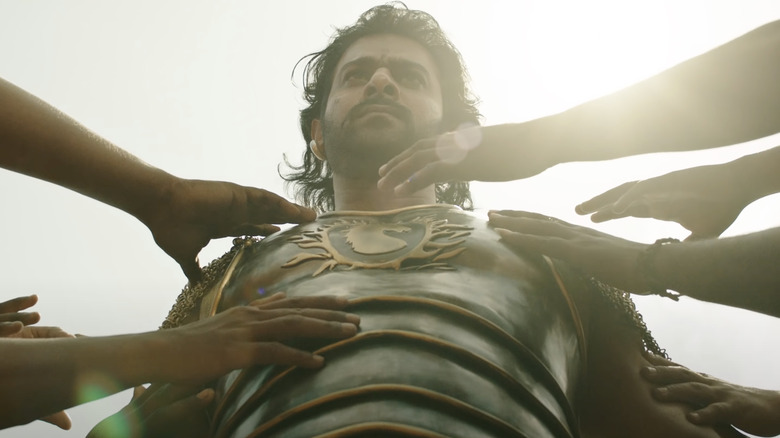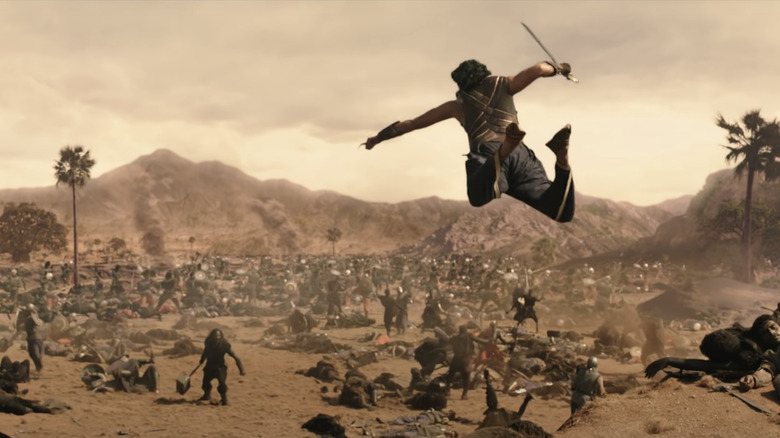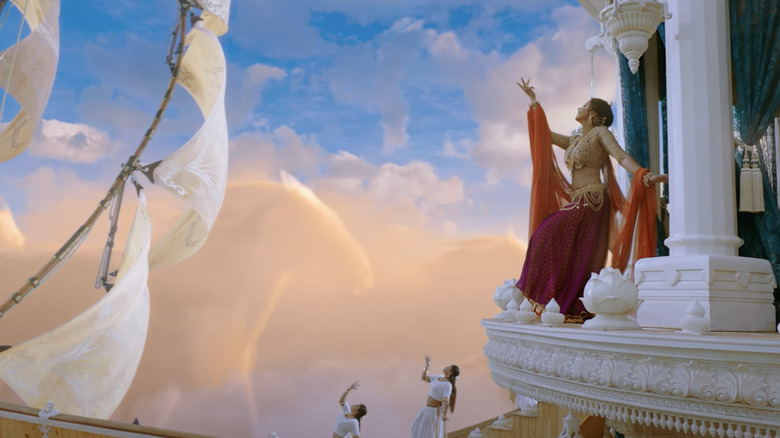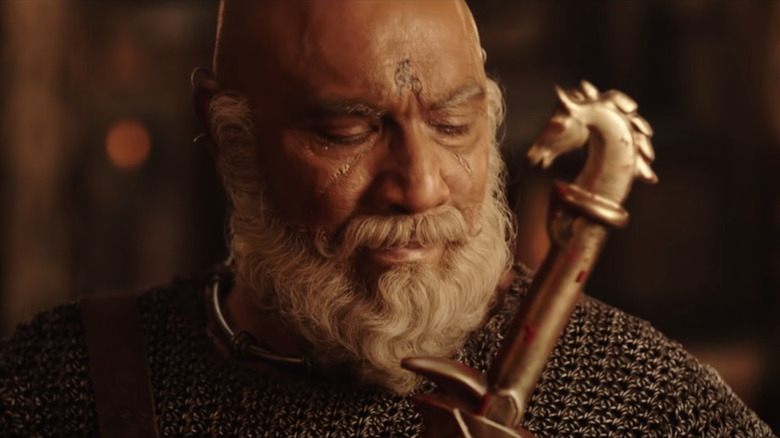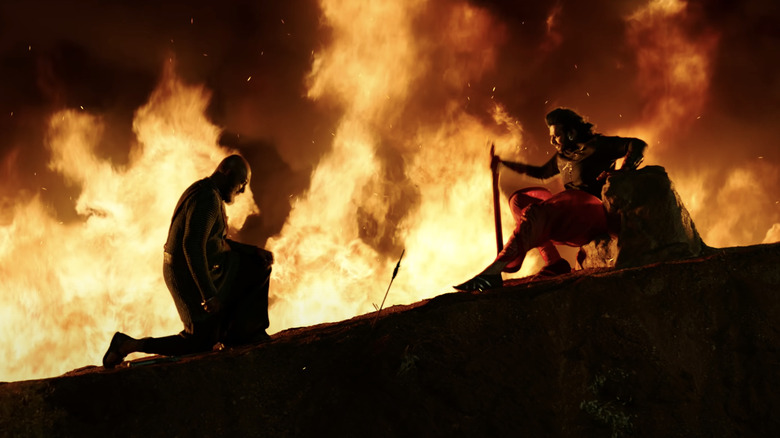The Daily Stream: The Bāhubali Films Bring A New Meaning To The Word Epic
(Welcome to The Daily Stream, an ongoing series in which the /Film team shares what they've been watching, why it's worth checking out, and where you can stream it.)
The Movies: "Bāhubali: The Beginning" and "Bāhubali 2: The Conclusion"
Where You Can Stream Them: Netflix
The Pitch: Sivudu (Prabhas) is an extremely buff young man who lives amongst the Amburi tribe at the base of a ludicrously tall waterfall. He feels innately compelled to climb to its top but always finds himself falling. One day, the mask fitted to the face of a beautiful woman makes its way over the waterfall, instantly making Sivudu fall in love and seek out the woman. Not only does he find her, the fierce rebel warrior Avantika (Tamannaah), but he also discovers that he is not just some guy from a small village. Sivudu is actually Mahendra Bāhubali, the son of the beloved and murdered crown prince Amarendra Bāhubali of Māhishmati (also played by Prabhas). The kingdom Sivudu's father was set to rule now is under the tight control of his tyrannical uncle Bhallaladeva (Rana Daggubati), who also holds captive Sivudu's mother Devasena (Anushka Shetty). Parallel to the story of Sivudu, we see the rise to glory that Bāhubali takes on the battlefield and amongst the people of Māhishmati that causes the other members of his family to turn on him to maintain their own stranglehold on power.
Why it's essential viewing
If you are someone like me, you have recently been left absolutely gobsmacked by S.S. Rajamouli's revolutionary, bromantic action film "RRR." Well, prior to making what is the most expensive film in the history of Indian cinema, he made this mammoth two-part epic, which itself was the most expensive production when it was made. "Bāhubali: The Beginning" and "Bāhubali 2: The Conclusion" play like the grandest telling of a classical, myth-making story you could possibly imagine. Though the films obviously draw from Indian legends, western audiences can find just as much familiarity in the tropes as anyone else. It feels like part of the same story lineage that gave us "The Northman," "Hamlet," and "The Lion King." Duty, betrayal, fate, love, revenge. This is primal, foundational storytelling.
While the beats feel familiar, how they are presented across the two "Bāhubali" films feels entirely fresh. Rajamouli always has his eye on the operatic. He designs images and moments for maximum impact. He frames Prabhas in his two roles as a god, capable of the greatest feats one could ever imagine. He isn't a warrior. He's the best warrior. He isn't romantic. He's the most romantic. Conversely, his enemies are the most monstrous. Rana Daggubati as Bhallaladeva is every bit as jacked as Prabhas, but his physicality is framed as imposing and menacing compared to the aspirational gaze upon our leading man. It's like the theatrics of a WWE match were given the framework of a multi-million dollar sword and sandals epic.
Putting the money on the screen
While saying the "Bāhubali" films were the most expensive movies produced in India at the time is accurate, it is also slightly misleading. You hear a phrase like that and expect a budget on par with a major American studio film. This two-part, five-and-a-half-hour extravaganza cost about ₹430 crore (4.3 billion Rupees), which only comes out to about $56 million. Compared to the mega-blockbusters that Hollywood produces, this barely scratches the surface. This essentially costs the same as Kenneth Branagh's "Murder on the Orient Express," which mostly takes place inside train cars where people are just talking to each other.
Rajamouli, being the wonderful maximalist that he is, makes this feel like it has double or triple the budget of your typical Marvel movie. He understands scale in a way far too few big-budget filmmakers do nowadays. Scale is not just in how much stuff you can cram into a frame. It's about conveying to the audience the entire scope of a given scene. In "Bāhubali: The Beginning," there is a gigantic battle scene between the Māhishmati army, led by Bāhubali and Bhallaladeva, against the encroaching Kālakeya tribe. Most films would just show you the sheer amount of people on each side of the conflict and think that is enough. Rajamouli makes sure you understand each separate faction of the Māhishmati army, what weapons they control, who leads each faction, and the formations of attack and defense utilized.
Because you have a full understanding of the mechanics and geography of the battle, you can bounce back and forth between the various forces and understand exactly what they are doing and how they affect the others in the battle. There are hundreds of physical soldiers and thousands more added digitally, yet you are never lost or distanced from the action. It is not about the number of resources you have at your disposal making a movie. It's about how you use what you do have.
Not sacrificing emotion for spectacle
With all the grandeur that Rajamouli puts on the screen in the "Bāhubali" pictures, the characters, relationships, and emotion could easily get lost, buried under the weight of the film's spectacle. This is not a case of style over substance in the slightest. As so many of you have seen with "RRR," the emotional components of Rajamouli's storytelling are just as operatic as his visual sense, and that remains true in the "Bāhubali" films. He imbues every spectacular image with personal stakes that match the frame's visceral stimulation. Because he is working with material that aims to be elemental, he can mine so easily our connections with those core concepts.
It also helps that his cast is not just a group of physically gifted performers but actors who can command the screen as well as the best movie stars you can imagine. Yes, Prabhas is a statuesque marvel to behold, but as an actor, he has a phenomenally light touch. Particularly in the role of Shivudu, he has a grace about him that is charmingly boyish. As a romantic partner, he has wonderful chemistry with both Anushka Shetty and Tamannaah, depending on which role he is playing.
The true standout performance of the films comes from a character I have yet to mention, and that is Sathyaraj as the slave Kattappa. This character comes from a long line of slaves bound personally to the kings of Māhishmati, essentially acting as his personal sellsword. He acts as a father figure to Bāhubali and has to ... well, he goes through a lot. Sathyaraj delivers a tender, honest, and heartbreaking turn here, ranging from Falstaff to Aaron Burr. The whole cast perfectly locks into Rajamouli's larger-than-life tone, but Sathyaraj shines brightest.
How to stream the Bāhubali films
It seems odd that I would need to do some explaining on how to properly stream "Bāhubali: The Beginning" and "Bāhubali 2: The Conclusion." It seems pretty self-explanatory. You fire up Netflix and hit play. Not so fast! If do a search for "Bāhubali," you will get four different options for the first film and three for the second. The reason for this is that the various regions across India all speak different languages and are dubbed. When these films go to streaming, each language is essentially treated as its own separate film. You have already encountered this issue if you have tried to watch "RRR" on Netflix, which has been dubbed into Hindi from the original Telugu. The original Telugu version can only be streamed on the India-based service ZEE5, as the streaming rights are different for each version.
The "Bāhubali" films were simultaneously shot in Telugu and Tamil. Yes, that means they had to shoot many of the scenes twice to account for both languages. As Telugu is S.S. Rajamouli's first language, that would be the ideal way to watch the film. Unfortunately, that is not available on Netflix. In fact, the Telugu version is only available for the first film by digital rental or purchase in the United States. Meanwhile, the original Telugu version is completely unavailable in any way for "The Conclusion," which is quite a shame. That being said, both films are available to stream in Tamil on Netflix. As that is the other language the film was natively shot in, that would be the best option.
Regardless of what language you watch them in, you are in for a rip-roaring time that will make you desperate to dive even further into the wonderful world of Indian cinema. I am just a mere novice myself when it comes to the cinematic landscape of the country, but I know I want to engage with it as much as I possibly can. Not only do the "Bāhubali" films act as a great gateway, but they also show how much Hollywood could learn about making massive action epics. Because now, they look less than quaint in comparison.
